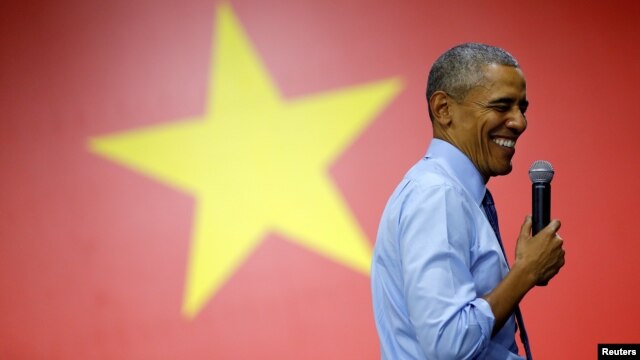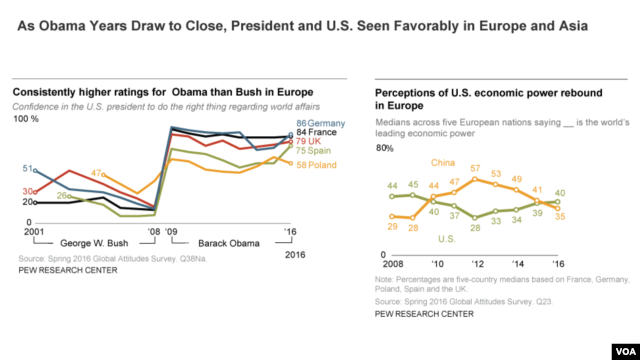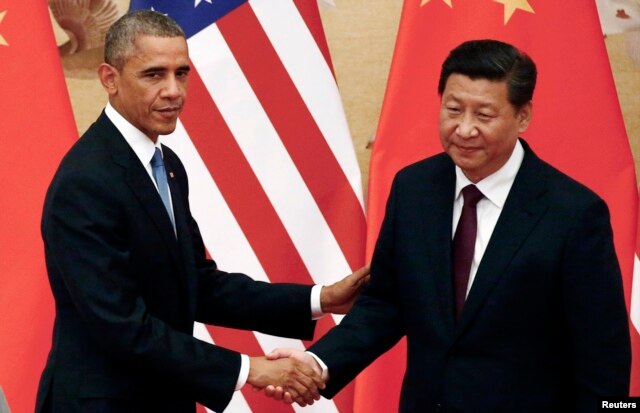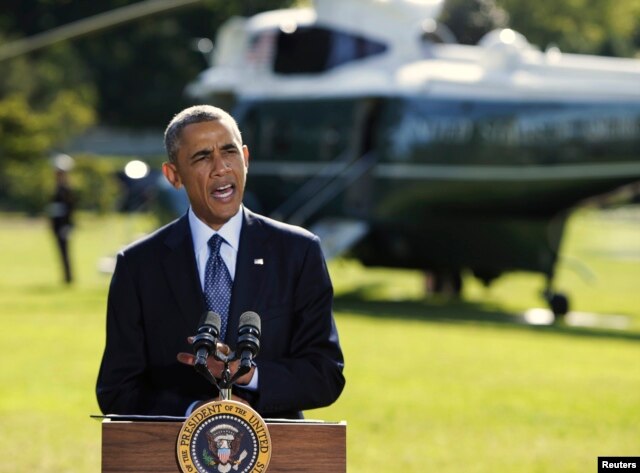Obama, US Get High Marks Around World in Pew Survey
News / USA
Obama, US Get High Marks Around World in Pew Survey
FILE - U.S. President Barack Obama reacts as he attends a town hall meeting with members of the Young Southeast Asian Leaders Initiative at the GEM Center in Ho Chi Minh City, Vietnam, May 25, 2016.
June 29, 2016 7:30 PM
A new survey by the Pew Research Center shows President Barack Obama continues to get largely favorable reviews throughout much of the world in the final days of his presidency.
Fifteen of the 16 countries surveyed in Europe and Asia expressed confidence in Obama’s ability to handle world affairs, although he has not received universal praise on the world stage during his two terms in office.
International ratings for Obama were higher than they were for his predecessor, George W. Bush, who was criticized for foreign policy issues and the spread of anti-American sentiment in many parts of the world.
The survey found Obama’s election in November 2008 sparked a revival of America’s global image, particularly in Western Europe.
At least half of the respondents in the nations surveyed had a favorable opinion of the U.S., except in Greece, where only 38 percent gave the U.S. a positive review. The U.S. received the most favorable ratings in Italy, Poland and Japan, where more than two-thirds expressed positive views. Ratings of the U.S. increased slightly in Germany and China, where public opinion of the U.S. has shifted in a positive direction since last year.
“There is greater appreciation for America’s role in international affairs,” Robert Hazan, chair of the political science department at Metropolitan State University in Denver, Colorado, said in an interview with VOA.
Diplomacy first
Pam Chasek, professor of international relations at Manhattan College in New York City, told VOA that Obama’s approach toward other countries is dramatically different from those of his predecessors. She characterized it as, “Let’s try the use of diplomacy and soft power rather than shoot first and ask questions later."
U.S. President Barack Obama shakes hands with China's President Xi Jinping in front of U.S. and Chinese national flags during a joint news conference at the Great Hall of the People in Beijing, Nov. 12, 2014.
In 2015, 49 percent of those polled in China rated the U.S. unfavorably, compared with 44 who gave positive ratings. The latest survey found improvement over last year, with 50 percent viewing the U.S. positively while 44 percent gave negative opinions.
“The U.S. is treating China as almost an equal” on climate change and other issues, said Chasek. “In that part of the world, that level of respect is rewarded.”
In Europe and China in particular, Hazan said, “America’s foreign policy is being viewed globally as a more reasonable foreign policy, as a model.”
Previous surveys throughout the Obama era have shown largely positive opinions toward the U.S. But America’s popularity ratings have not increased in recent years in some countries, particularly in the Middle East.
Effects of past ties
The jaded views of the U.S. in some countries may be the residual effects of America’s past relationships.
“The U.S. has long been seen as an enabler of corrupt regimes,” said Chasek. She said previous administrations believed playing the role of the enabler would bring stability and help “prevent the rise of Islamists” in those countries.
Presumptive Democratic presidential nominee Hillary Clinton, who once was Obama’s secretary of state, got mostly favorable reviews in Europe, although they are consistently lower than Obama’s.
Donald Trump, the presumptive Republican presidential nominee, did not fare nearly as well. In nearly half the nations polled, the segment of the respondents who expressed confidence in Trump was only in the single digits.
“Hillary Clinton is a known quantity,” said Chasek, explaining Clinton’s positive ratings in Europe. She said many of the people she had spoken to in diplomatic circles consider Trump as “unqualified, with no knowledge of foreign policy,” and “very belligerent.”
Islamic State
A separate Pew Research Center survey released June 13 found large majorities of the respondents in Europe saw Islamic State as a significant threat. The new survey found at least half of those surveyed in all 15 countries overwhelmingly supported U.S.-led military operations against IS in Syria and Iraq.
FILE - President Barack Obama delivers a statement at the White House in Washington on airstrikes in Syria, prior to departing for the United Nations in New York, Sept. 23, 2014.
Hazan said the current U.S. administration is dealing with conflicts in those countries differently than its predecessors did. “Diplomacy has been at the forefront and, as it were, the boots-on-the-ground strategy has been kind of a last-resort matter,” he said.
“We are paying more attention to how we can perhaps manage conflicts rather than have a knee-jerk [military] reaction,” Hazen added.
The survey found most countries were “fairly divided” over America’s power as a world leader compared with 10 years ago. Japan was the only country in which most of those surveyed thought the U.S. was less important. India was the only nation with a majority saying America’s power had increased over the past decade. Forty-six percent of Americans believe their country is playing a less important role in the world.
Economic power
America’s perception as a world economic power was more favorable compared with its standing as a global power. As the U.S. economy continues to grow after the Great Recession, and China’s once fast-growing economy falters, majorities in seven of the 16 countries believed the U.S. was the world’s leading economic power. Only the Australians said China’s economy was the world’s strongest.
Fifty-four percent of Americans thought the U.S. was the world’s strongest economy, while 34 percent said China’s was strongest. That was a significant shift in opinion from 2014, when 40 percent of Americans thought the U.S. had the world’s most robust economy and 41 percent believed it was China’s.
The Pew Research Center, Washington-based and nonpartisan, conducted the survey across Europe and Asia, as well as in the U.S. and Canada. More than 20,000 people were surveyed from April 4 through May 29.





Comments